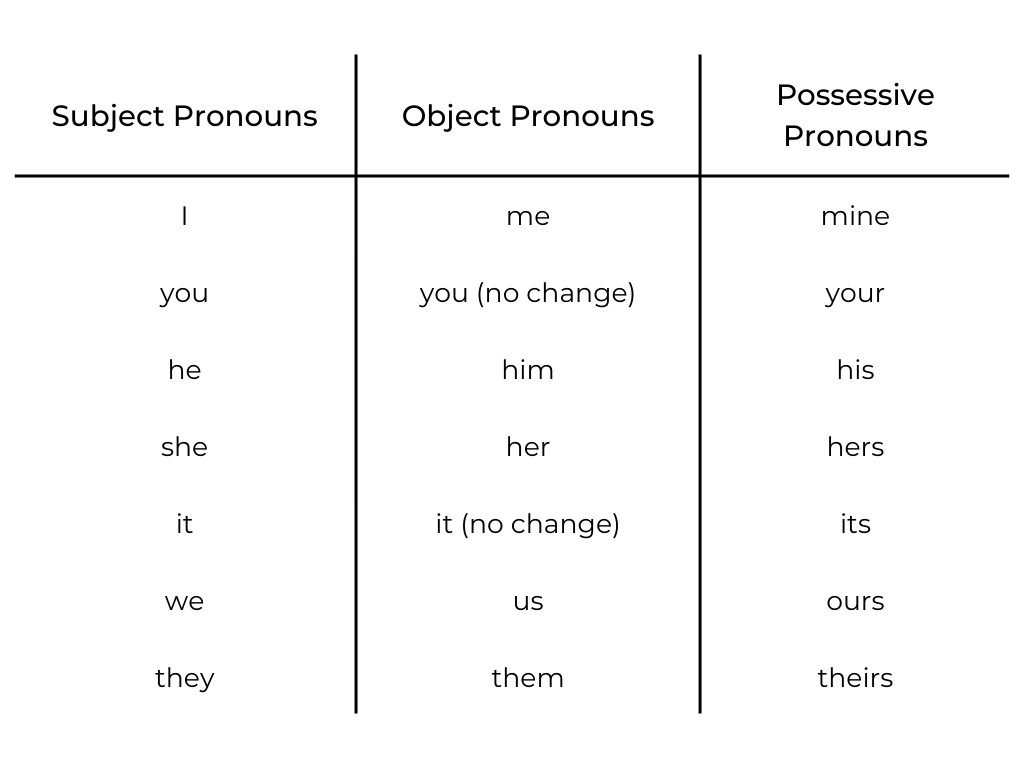111 Pronouns
Pronoun Reference
Pronouns replace nouns in a sentence. They are:
· Subject Pronouns – I, you, he, she, it, they
· Object Pronouns – me, you, him, her, it
· Possessive Pronouns – my, mine, your, yours, his, her, hers, its
· Interrogative Pronouns – who, whom, whose, what, which
· Indefinite Pronouns – another, each, everything, nobody, either, someone
· Relative Pronouns – who, whom, whose, that, which
· Reflexive and Intensive Pronouns – myself, yourself, himself, herself, itself
· Demonstrative Pronouns – this, that
Pronoun-Antecedent Agreement
Antecedents: An antecedent is the noun to which a pronoun refers.
· Yasmine, her
· Dog, it
· Samuel, him
· The singers, they
· You and me, we
Rule: There are two types of pronoun problems: vague antecedents and missing antecedents.
Problem 1: Vague Antecedents
It can sometimes be unclear which noun a pronoun is replacing. See the problem and resolution below.
Incorrect Example: Paul told Jake he had a test on Friday.
(Who has the test? Is it Paul or Jake?)
Correct Examples: Paul told Jake, “You have a test on Friday.”
OR
Paul told Jake that Jake had a test on Friday.
Problem 2: Missing Antecedents
Sometimes sentences don’t have a noun at all, leaving us to wonder what the pronoun is referring to.
Incorrect Example: Paul was an artist, but he never sold any of them.
(Paul never sold what? Drawings, paintings, sculptures?)
Correct Example: Paul was an artist, but he never sold any of his paintings
Pronoun Case

Subject and Object Pronouns
Pronouns change their form depending upon the place that they occupy in a sentence. Here is a list of subject, object, and possessive pronouns as in the above graphic:
Subject Pronouns Object Pronouns Possessive Pronouns
I me mine
you you (no change) your
he him his
she her hers
it it (no change) its
we us ours
they them theirs
Subject Pronouns
The subject pronouns are subjects of verbs.
They are getting tired. (They is the subject of the verb are getting.)
She will decide tomorrow. (She is the subject of the verb will decide.)
We women organized the game. (We is the subject of the verb organized.)
Several rules for using subject pronouns and mistakes people sometimes make are explained starting below.
Rule 1: Use a subject pronoun in a sentence with a compound (more than one) subject.
Incorrect: Nate and me went shopping yesterday. Correct: Nate and I went shopping yesterday.
Incorrect: Him and me spent lots of money. Correct: He and I spent lots of money.
If you are not sure what pronoun to use, try each pronoun by itself in the sentence. The correct pronoun will be the one that sounds right. For example, “Me went shopping yesterday” does not sound right; “I went shopping yesterday” does.
Rule 2: Use a subject pronoun after forms of the verb be. Forms of be include am, are, is, was, were, has been, have been, and others.
It was I who telephoned.
It may be they at the door.
It is she.
The sentences above may sound strange and stilted to you, since they are seldom used in conversation. When we speak with one another, forms such as “It was me,” “It may be them,” and “It is her” are widely accepted. In formal writing, however, the grammatically correct forms are still preferred. You can avoid having to use the pronoun for after be simply by rewording the sentence. Here is how the preceding examples could be reworded:
I was the one who telephoned.
They may be at the door.
She is here.
Rule 3: Use subject pronouns after than or as. The subject pronoun is used because a verb is understood after the pronoun.
You read faster than I (read). (The verb read is understood after I.)
Tom is as stubborn as I (am). (The verb am is understood after I.)
We don’t go out as much as they (do). (The verb do is understood after they.)
Avoid mistakes by simply adding the “missing” verb at the end of the sentence.
Object Pronouns
The object pronouns (me, him, her, us, them) are the objects of verbs or prepositions. (Prepositions are connecting words like for, at, about, to, before, by, with, and of.)
Rita chose me. (Me is the object of the verb chose.)
We met them at the ball park. (Them is the object of the verb met.)
Don’t mention UFOs to us. (Us is the object of the preposition to.)
I live near her. (Her is the object of the preposition near.)
People are sometimes uncertain about what pronoun to use when two objects follow the verb.
Incorrect: I spoke to George and he. Correct: I spoke to George and him.
Incorrect: She pointed at Linda and I. Correct: She pointed at Linda and me.
Hint: If you are not sure what pronoun to use, try each pronoun by itself in the sentence. The correct pronoun will be the one that sounds right. For example, “I spoke to he” doesn’t sound right; “I spoke to him” does.
Reflexive Pronouns
Reflexive pronouns are ones that refer to the subject of a sentence.
Here is a list of reflexive pronouns:
myself ourselves
yourself yourselves
himself themselves
herself
itself
Sometimes the reflexive pronoun is used for emphasis:
You will have to wash the dishes yourself.
We ourselves are willing to forget the matter.
The president himself turns down his living room thermostat.
Note: In the plural -self becomes -selves.
Lola washes herself in Calgon bath oil.
They treated themselves to a Bermuda vacation.
